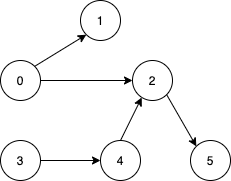Minimum Number of Vertices to Reach All Nodes
Leetcode Daily Challenge (18th May, 2023)
Problem Statement:-
Given a directed acyclic graph, with n vertices numbered from 0 to n-1, and an array edges where edges[i] = [from<sub>i</sub>, to<sub>i</sub>] represents a directed edge from node from<sub>i</sub> to node to<sub>i</sub>.
Find the smallest set of vertices from which all nodes in the graph are reachable. It's guaranteed that a unique solution exists.
Notice that you can return the vertices in any order.
Link: https://leetcode.com/problems/minimum-number-of-vertices-to-reach-all-nodes/
Problem Explanation with examples:-
Example 1

Input: n = 6, edges = [[0,1],[0,2],[2,5],[3,4],[4,2]]
Output: [0,3]
Explanation: It's not possible to reach all the nodes from a single vertex. From 0 we can reach [0,1,2,5]. From 3 we can reach [3,4,2,5]. So we output [0,3].
Example 2

Input: n = 5, edges = [[0,1],[2,1],[3,1],[1,4],[2,4]]
Output: [0,2,3]
Explanation: Notice that vertices 0, 3 and 2 are not reachable from any other node, so we must include them. Also any of these vertices can reach nodes 1 and 4.
Constraints
2 <= n <= 10^51 <= edges.length <= min(10^5, n * (n - 1) / 2)edges[i].length == 20 <= from<sub>i,</sub> to<sub>i</sub> < nAll pairs
(from<sub>i</sub>, to<sub>i</sub>)are distinct.
Intuition:-
Find all nodes and all destination nodes.
Find all source nodes by subtracting destination nodes from all nodes.
Return source nodes.
Solution:-
Create a set of all nodes by using range(n).
Create a set of all destination nodes by using list comprehension.
Create a set of all source nodes by subtracting destination nodes from all nodes using set difference.
Return source nodes by converting set to list.
Code:-
JAVA Solution
class Solution {
public List<Integer> findSmallestSetOfVertices(int n, List<List<Integer>> edges) {
Set<Integer> allNodes = new HashSet<>();
for (int i = 0; i < n; i++) {
allNodes.add(i);
}
Set<Integer> destinationNodes = new HashSet<>();
for (List<Integer> edge : edges) {
destinationNodes.add(edge.get(1));
}
Set<Integer> sourceNodes = new HashSet<>(allNodes);
sourceNodes.removeAll(destinationNodes);
return new ArrayList<>(sourceNodes);
}
}
Python Solution
class Solution:
def findSmallestSetOfVertices(self, n: int, edges: List[List[int]]) -> List[int]:
all_nodes = set(range(n))
destination_nodes = set(destination for _, destination in edges)
source_nodes = all_nodes - destination_nodes
return list(source_nodes)
Complexity Analysis:-
TIME:-
The time complexity is O(n) where n is the number of nodes in the graph as we are iterating over all nodes once.
SPACE:-
The space complexity is O(n) where n is the number of nodes in the graph as we are storing all nodes in a set.
